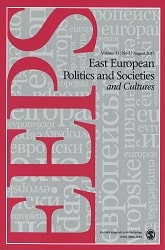Magical Realism in Olga Tokarczuk’s Primeval and Other Times and House of Day, House of Night
Magical Realism in Olga Tokarczuk’s Primeval and Other Times and House of Day, House of Night
Author(s): Ewa V. WampuszycSubject(s): Cultural history, Novel, Polish Literature, Transformation Period (1990 - 2010)
Published by: SAGE Publications Ltd
Keywords: Olga Tokarczuk; magical realism; Primeval and Other Times; House of Day, House of Night; contemporary Polish literature;
Summary/Abstract: This article analyzes the magical realist mode of writing in two novels by Polish author Olga Tokarczuk: Primeval and Other Times (1996) and House of Day, House of Night (1998). While Tokarczuk herself rejects the label “magical realism,” her novels exhibit such key magical realist characteristics as disruption of rationally ordered time and space, the rejection of dominant historical and cultural narratives, an exploration of alternate epistemological forms of inquiry, and literalization of language, metaphor, and imagination. In Primeval, Tokarczuk presents a world that exists at the intersection between cyclical (mythical) and linear times; in House the novel asserts historical order through the dominance of space over time. In both novels, Tokarczuk’s poetics of the Word (Logos) becomes key to establishing a sense of magical realism in the texts. By using these and other magical realist narrative techniques, Tokarczuk deftly questions dominant discourses of Polish history and culture, such as that of the “Recovered Territories” or the power of religious faith. The presence of the magical realist mode in Tokarczuk’s work has important implications for the study of magical realism in general and Polish literary studies in particular.
Journal: East European Politics and Societies
- Issue Year: 28/2014
- Issue No: 02
- Page Range: 366-385
- Page Count: 20
- Language: English
- Content File-PDF

